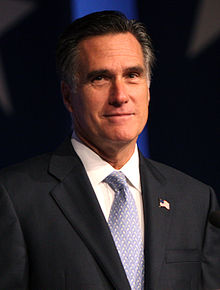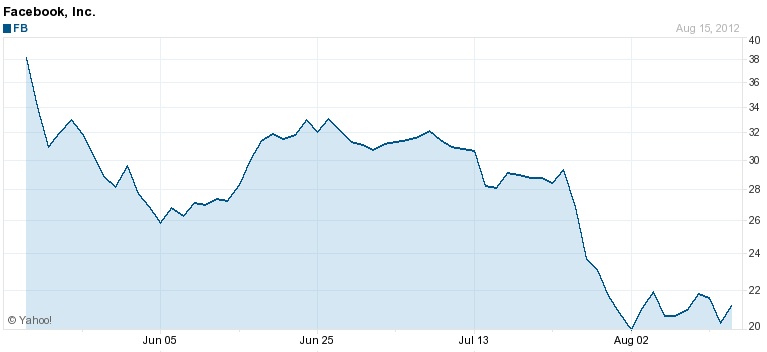Mike, you’re kidding right? You don’t even like Facebook (we know, we read your blog and tweets) how could you have a post with such a title?
Investing is all about finding value and exploiting it. At a market cap of $100B you’d have to be crazy to buy stock in a $4B barely profitable company despite the many other assets it boasts. However, at $20B market cap, while still richly valued, there could be some upside in the investment.
$FB has $4.33B in sales trailing 12 months. It has net cash of nearly $10B on the balance sheet. It has Free Cash Flow of $1.7B ttm. As of market close August 16, 2012, the market cap is $42B and price per share is $19.87. If we back out the total cash / share of $4.37, we get intrinsic worth of $15.50 / share and that girls and boys, is interesting as an investment opportunity.
Recently we saw the first tranche of insiders being able to sell and it put downward pressure on the stock. I think we’ll see a bounce up in the near-term until the next insider sell off. That could be the right time to take a position if you are so inclined. I’m now considering it and that’s not something I ever expected to be able to say!
So, YMMV, but a mid-term win could be possible as $FB reaches the $16-18 / share price range. Caveat Emptor, as always.
Business, Technology & Science
Facebook, A Buy?
Commentary, Politics
Leave Romney Alone on Taxes

This issue is a red herring and it’s taking away from what could be substantial discourse on the issues. Just like the whole stupid birth certificate thing with President Obama.
While it’s highly unlikely that I will cast my vote for Mr. Romney this fall, it has nothing to do with his taxes. He’s a wealthy man and a smart man, and like many smart, wealthy citizens he is proactively managing his wealth to minimize the impact of taxes upon it. Just like we all do. There’s no story here, I don’t believe he has done anything illegal or irregular given his financial circumstances.
Where the debate can and should emerge is not about Mr. Romney’s income taxes, but about the tax system overall. We need to normalize and stabilize our tax revenue while at the same time cutting costs. As Mr. Romney will no doubt know from his time leading Bain Capital, you can’t cut yourself to success. You have to balance your approach making prudent investments that will help in the short, mid, and long-terms while watching your pennies if you’re going to turn around an entity.
What should concern potential voters is not that Mr. Romney paid 13% on his taxes, but rather that the system allowed that to happen. This is a very simple issue. Civilization requires public funding to survive and thrive. People with more wealth will always be asked to contribute more than those without wealth – this is a fact, get used to it. In days gone by, people of wealth and means would actually recognize their favorable position and step up to these responsibilities – like Warren Buffett is espousing.
I’m all for a smaller, less intrusive government that closely examines each penny of our money that is collectively spent or invested. However, I also believe that if we are to have defense, physical infrastructure, and services that only a government should offer, we have to find a way to pay for it sustainably and that means we step up to pay taxes.
The debate should center on what the balance of revenue (taxes) is across the income levels of population relative to the expenditures that are being made on our behalf. Near as I can tell, the argument is all about the candidates personally. That’s a lost opportunity.
I’d like to hear specific plans from each candidate about how they would approach the next 4 years from an income, expenditure, and investment perspective. I’d like to hear how they would plan to get Congress to go along with those plans. I’d like to hear what ideas they have to offer in these areas.
What I don’t want to hear is how Mr. Romney is cheating the system, he’s not. I don’t want to hear about how a tax cut to make wealthy people like Mr. Romney pay lower taxes – that’s not a solution, that’s part of the problem. I don’t want to hear about large, new government programs to stimulate the economy, that’s not part of the solution either.
As a business man, I can say categorically that nothing either candidate has yet communicated makes a bit of difference in my business. Not. One. Bit.
The best thing the government (Federal, State, and Local) could do is get out of my way and begin to function in the areas it needs to function in. Minimizing my taxes is of course nice, but I have to admit, I’d like to have great roads to bring customers to my town so they can visit my store and buy things. I’d like healthy, happy customers and staff. I’d like to be able to find well educated potential staff members. I’d like customers to be able to pay for a tank of gas (or electrical charge) to drive their cars to come visit. These are areas the government can and should step into and facilitate.
So candidates, what say you? Do you have a plan? Do you care to share it? I’m listening…
Commentary
Rantings of a Grumpy Old Man

Let me preface this by saying I’m still wiped out from my whirlwind Vegas trip.
The stats? 28 hours duration. ~1,200 miles (1,900km) driven. No air conditioning in the vehicle. Temperatures as high as 116 degrees fahrenheit (46C) and as low as 54F (12C.) ~3,000 vendors covering the entire Las Vegas Convention Center. ~2,990 of them offering very little in the way of interesting. So, my mindset is a little grumpy in the best of circumstances.
General grumpy thoughts in no particular order.
I drove for 2 reasons: one I hoped to be able to transport product back from the show. Buzz!!!! WRONG. Nothing I wanted to bring back was available to bring back. Two, I am so finished with flying. I didn’t want to give the hosebag airlines another dollar. So……I condemned myself to 18 hours of driving.
Speaking of hosebag airlines, I wrote United Airlines CEO Jeff Smisek copying his board of directors regarding a recent bad experience on his airline. I expected I’d get a form letter with platitudes as a response. Well, that bar was even too high for this corporate moron – after 22 years of flying with United loyally, we’re done.
United, we’re breaking up. It’s not me, it’s you. You irretrievably suck.
Back to driving, I love road trips as a general rule. They require only enough mental energy to distract me from multi-tasking and leave enough bandwidth free to think about other things without external stimulus. So I was looking forward to some alone time to churn through my increasingly complicated professional life and business ventures.
Buzz WRONG! Now, I knew my air conditioning was a little weak, but I didn’t anticipate the blast furnace that starts about south San Jose and intensified as I moved inland. I know, it’s summer, it’s the desert, buy a clue. The lack of serviceable AC coupled with the extreme temperatures made my gedanken time non-existent.
On the road, people are horrible – they are clueless – they have no consistency or lane discipline – they have no concept of constant speed – they have no ability to judge distance. It’s amazing that the interstate highways aren’t litered with bits of wreckage strewn mile after mile.
On the subject of lane discipline, the Germans have it right on the Autobahn. Cruise in the slow lane, move into the hammer lane to pass and move back over to the right. Many people can travel safely and efficiently at high rates of speed. We have land yachts that move along 5mph below the posted speed limit in the passing lane. We have truck A lumbering along at 45mph wanting to pass truck B moving at 44mph where it takes 5 minutes to complete the exercise.
This makes me want to pull the vehicle in question over and beat the driver senseless with a tire iron. Not that I would ever act on such impulses.
See, I told you I was grumpy!
OK, enough ranting. I’m done now. Back to your regularly scheduled programming.
Commentary
Sometimes What You Read Baffles Me
The Pod Hotel entry from 2008 is going through the roof on my visitor statistics. Anyone want to clue me in on why this is interesting now?

Commentary, Innovation
Your Most Valuable Resource
Yesterday I saw a tweet from @CoachLeal stating “Your greatest resource is your time. – Brian Tracy” and I replied back “Actually, it’s your attention. Time is a poor proxy for attention.”
Since this is a longer than 140 character at a time concept, I decided to write a blog entry to delve into the topic a with more depth.
Time is inexorable and time is limited. That unto itself means that time is a valuable resource. That means that managing one’s time is critical to get the most out of the time we do have. Now, what does “the most” mean? That’s a head scratcher. How do you calculate a return on asset for your time investment?
It’s situational at best. If one is on vacation, one might measure the effectiveness of the time investment on the percentage of pleasurable moments experienced. If one is in a business meeting, one might measure the ROT (return on time) with the quality and impact of a decision resulting from the activity.
While time is limited and time is valuable and some ROT can be measured situationally, I find that the most scarce (and thus valuable) resource we possess is our attention.
In any given moment, one is likely to have multiple demands made upon one’s attention. As I sit here and write this, I’ve had email demands, text message demands, phone demands, in-person demands, and random internal demands evaluating if I should be responding to any of these stimuli balanced against the mental list of internal demands for attention, balanced against the time at hand. My experience is as the world becomes more connected and real-time, this demand to provide attention to multiple, competing inputs is increasing and that causes fatigue making it more likely for people to simply drop out to remove themselves from the constant bombardment one experiences.
A natural coping mechanism has emerged that I like to call continuous, partial attention. That’s where you are attention bandwidth slicing switching primary attention between the many things demanding one’s attention. For example, it’s not uncommon for me to be carrying on a conversation with my Spouse, “watching TV,” and handling an online task concurrently. Which raises the question, are any of these things being done well?
Several recent studies have indicated (Google them, I’m pressed for attention!) that multi-tasking – which is an external expression of continuous partial attention (CPA) – is not as effective or high quality as focused work on a single task. Since CPA is as much internal as external, I’m not sure that this holds true, but there is at least some commonality. That leads me to the “so what” portion of this post.
A change I’ve attempted (and mostly failed at thus far) is to simply select what I’m going to pay attention to in any particular moment and ignore the rest of the noise. What I’ve discovered (anecdotally since it’s hard to do this as a study on one’s self) is that I feel less stressed, that the quality of interaction or output of activity is higher quality, and that overall the quality of life improves when I have been successful at single, serial focus vs. CPA.
So what do you think? Is attention the most valuable resource? Any suggestions/successes/failures you have experienced? Share them if you like.
« Previous Entries
» Next Entries





